Greetings, Wilkes community!
The fall semester is halfway over. Writing deadlines are logged into our calendars, daily schedules feel a bit more cramped, and the air gets crisper by the day as we plummet into autumn. I hope you’re all savoring the turn of the season and finding ways to write through it.
I spent some time speaking with program-affiliated people who are trying new things, enriching their local communities, and using their gifts to benefit the world around them. They’re pretty perfectly embodying the three focal points of the Maslow Family Creative Writing Program: Craft, Community, and Career.
We all know that creating is difficult and sometimes – often – scary. But let’s learn some lessons from the courageous change-makers here.
Cheers,
Hallie O’Neill, MFA ’23
Maslow Family Creative Writing Program Updates
Festivalpalooza!
Our director is logging some travel miles! Our program has recently sponsored, is currently sponsoring, or is about to sponsor the following conferences and events:
August
– The [margins] Conference for Underrepresented Writers in Denver, CO, with Spoken Word faculty mentor Angelique Palmer
– HippoCamp Conference for Creative Nonfiction in Lancaster, PA (founded/directed by alum/faculty mentor Donna Talarico), with Patti Naumann and Molly Bilinski
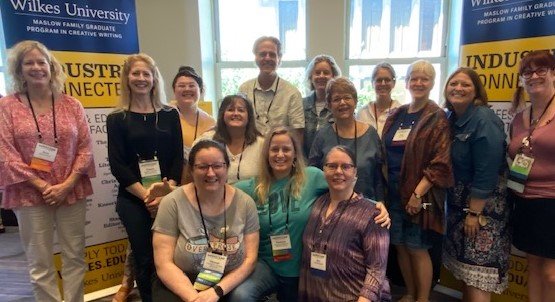
September
– New York City Poetry Festival on Governors Island, NY (with readings by Wayne Benson, Phil Brady, and Tim Seibles), with Caroline Hayduk and Julianna Evans
– Scranton Fringe Festival (playwriting), with Mandy Pennington
– Youngstown, OH Literary Festival, with Phil Brady and Etruscan Press
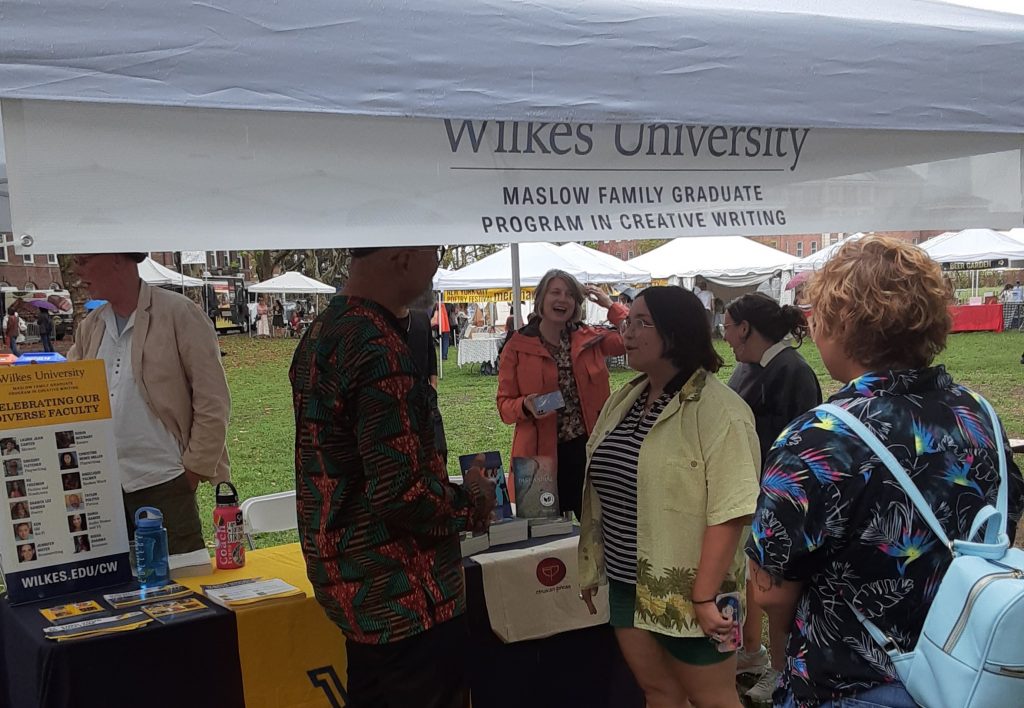
We’re grateful for the alumni volunteers who have helped us to recruit new students at each of these events!
Bigger and Better Than Ever
After welcoming 23 new students in June and hiring ten new faculty mentors last year, our program is truly thriving with 85 students enrolled, capping off around 90 in January. Our thanks to Admissions counselor Nick Tomaskovic and administrative assistant Patti Naumann for all their help recruiting, assisting, and enrolling our new students.
Marlon James to Visit Wilkes in January
Our winter residency (Jan 6-14) will be in person this year (God willing!), and we will be ever-so-happy to welcome back one of our most accomplished alumni, Man Booker Prize winner Marlon James, for a reading and book signing on January 13th at 7 pm in the Darte Center.
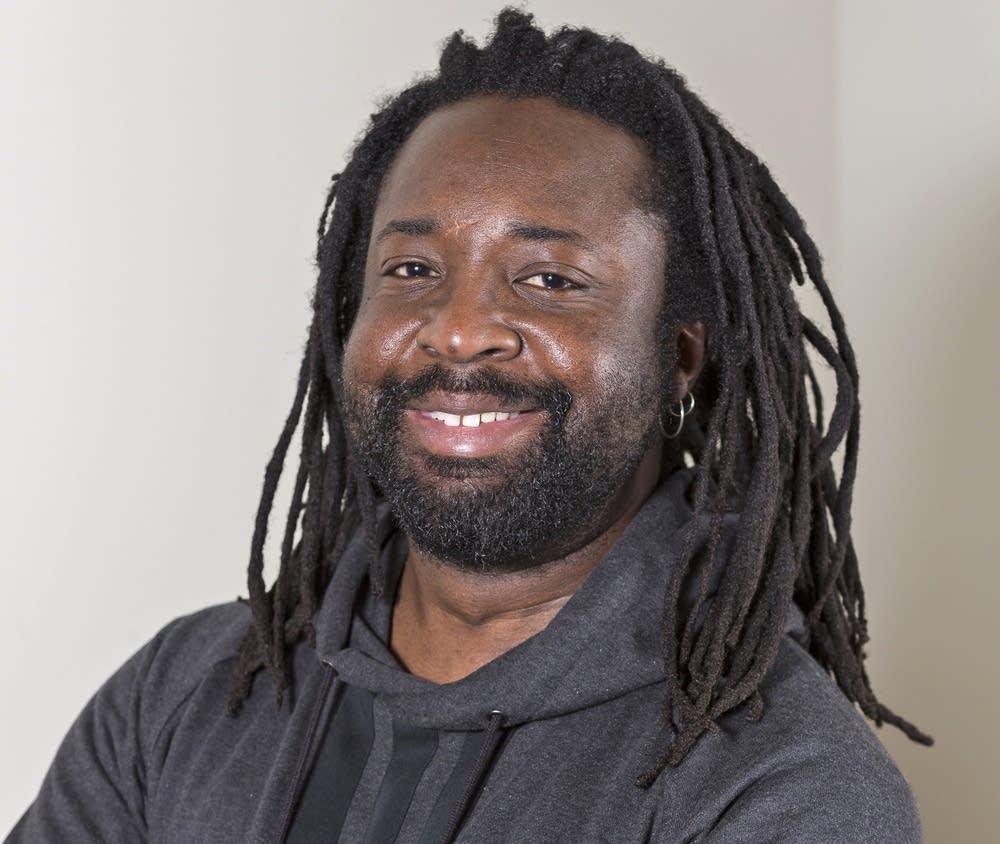
Independent Publishing – A Collective Labor of Love
In August of 2022, program alum and Etruscan Press Production Editor Pamela Turchin contributed a piece to the Times Leader (click to read) to discuss how she found herself working at an independent book publisher in her hometown. She sees the Etruscan operation as part of community revitalization.
“Whether you’ve spent your whole life here, are making a new start, or returned to be near family, it’s important to be involved in your community,” wrote Turchin.
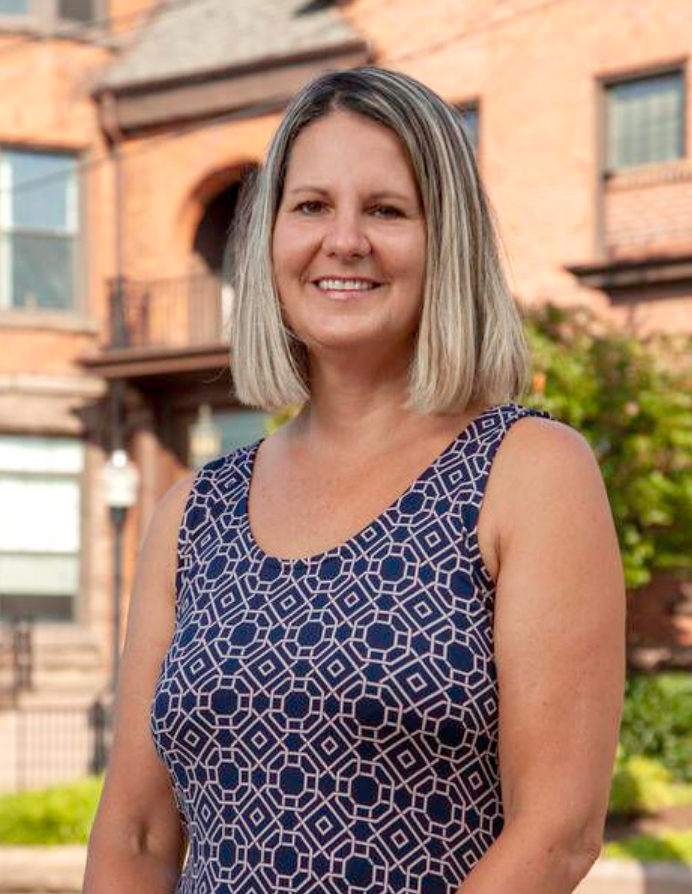
We asked two other Wilkes-affiliated publishers, Kaylie Jones Books and Hippocampus Magazine and Books, to weigh in on the decentralization of publishing, the value of a small-shop operation, and the importance of community.
Putting a Place to the Name: Online to Onsite
By Donna Talarico

Running an online literary magazine can often feel solitary and disjointed, even as our volunteer team has grown in numbers. I imagine that as remote work becomes more ubiquitous, many more people understand what it’s like to work together from afar. That more people experience the tug of war of feelings that comes with trading shared physical environments for freedom and flexibility (and less overhead).
While there’s a clear difference between full-time employment on a remote basis and the volunteer work many of us do for the love of stories, I’ve been thinking a lot lately about the similarities between the two arrangements. Most notably, the need for community. And this makes me reflect on something I love about Hippocampus Magazine, an online journal of creative nonfiction founded in 2010.
Not long after I founded Hippocampus, I relocated from the Wilkes-Barre area to Lancaster County, Pennsylvania, to take a marketing and communications position at a liberal arts college. Moving somewhere new in your thirties is a little tricky. I often joked that I had no easy ways to meet people: no dog to walk, no children to take to daycare, and no religion to take me to a church. (You know, the usual ways folks might make friends.) I quickly realized that the small college town I’d moved to was perfect for many people, but I needed something more. So when my lease was up, I moved into Lancaster city.
Getting involved in local events and meeting people got easier. First, I took to Twitter, which was still newer at the time. I found some like-minded people that way, as well as suggestions for places to go, events to attend, etc. All it really took was to meet one “writerly” person – and then the pieces fell together. I could go on, but the topic of building or finding a local writing community is an article in itself! So, I’ll summarize: I discovered Lancaster was a gem of a city for creatives, and it certainly helped that it was full of historic buildings, great food, and diverse neighbors.
So back to Hippocampus. After about five years in, we added a creative nonfiction conference to the mix. We’d call it HippoCamp, a play on our name, and the first one would be held close to Hippocampus Headquarters (read: my apartment). I’d briefly considered making it a traveling conference, one that hits a new locale each year. But after the first magical year it was clear: Lancaster was home. It’s a city with open arms, and I love bringing people to it.
Bringing people to it. There’s a lot in that statement. Again, Hippocampus Magazine is an online publication. Part of our three-fold mission is ENGAGE. (Educate and Entertain are the others.) So we set out from the beginning to interact with our readers and contributors. Over the years, our readership grew and there was definitely a sense of community built over social media and email. But when we held that first in-person conference, we had a chance to bring our entire mission to life. We had given people a place to associate with the name: Lancaster. And now this mid-size PA city is now associated with Hippocampus Magazine.
This past summer we held our seventh HippoCamp. About a month before the conference I had the idea to do something special for our attendees at the opening session. Lancaster is known for being a welcoming city (it’s actually a Certified Welcoming City), so I approached a friend who works at the mayor’s office about the possibility of having a recorded welcome from Mayor Danene Sorace. They all enthusiastically agreed and, because city officials are always very busy, they asked if I’d be able to draft a script. (So I got to dust off my broadcast journalism skills from another era of my life!)
When I watched the final video (with words edited slightly for her style), I teared up. I’d nearly forgotten that I’d even written it because it was such a genuine message coming from Mayor Sorace (you can watch it here). Weeks later when I played the video at the conference orientation, I knew the attendees felt even more welcomed in Lancaster than they already felt.
So, thank you for staying with me; I know it’s taken me a while to get to my point. But I think the backstory is needed to give important context to the evolution, my own and the magazine’s. Writers need community. Communities need writers. Sometimes communities already exist and we join them, improve them, grow them. Sometimes we build them from scratch. Sometimes it’s a mix of all of the above.
An online journal can operate 100% virtually and be successful. But I think something that took Hippocampus Magazine to the next level was branching out with an annual in-person event at a regular destination, somewhere that gives an otherwise virtual entity a sense of place. (It is simply a bonus that this place is a city like Lancaster!)
A writing community can make us feel at home, whether it’s the city we live in or an event we go to once a year.
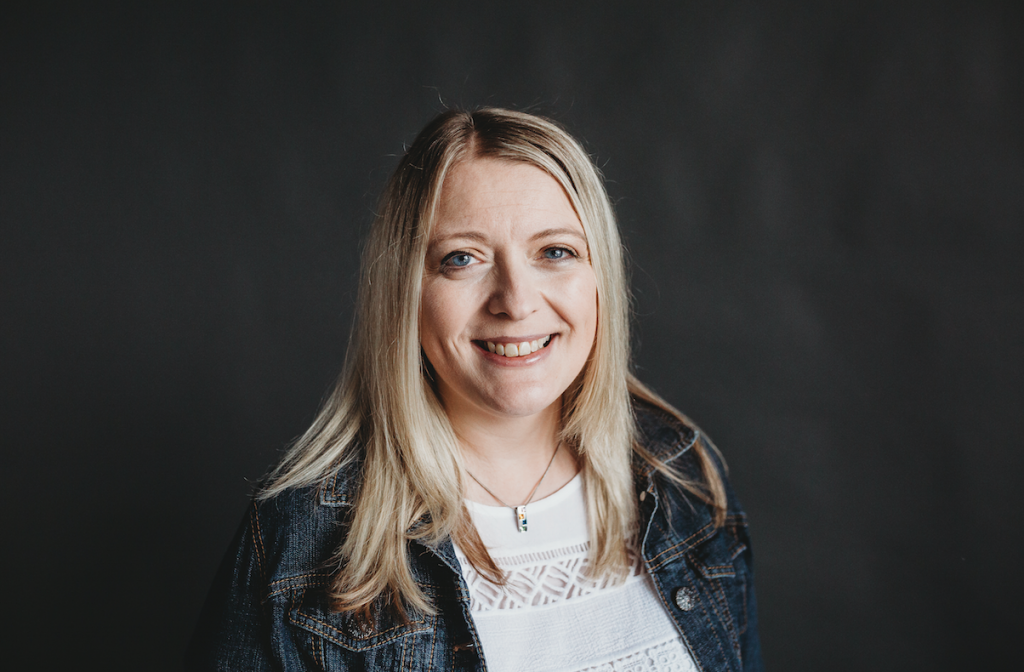
Donna Talarico is the founder of Hippocampus Magazine and Books and its annual conference, HippoCamp. By day she’s an independent content strategist in higher education. She has contributed to Guardian Higher Education Network, The Writer, mental_floss, Games World of Puzzles, and others. Her creative nonfiction appears in The Superstition Review, The Los Angeles Review, The Los Angeles Times, The Writing Disorder, and Wanderlust Journal.
Dedicated Writers Taking a Stand: the Story Behind Kaylie Jones Books
By Kristin Ivey
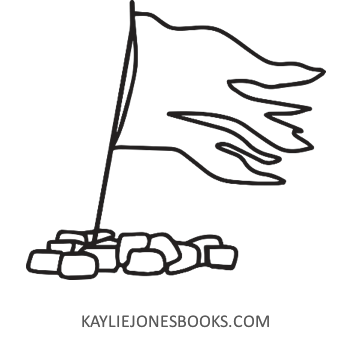
The first time I became aware of Akashic Books as a publisher was in 2015, which happened to be one year after Akashic had launched the Kaylie Jones Imprint. I was attending a writer’s conference in Florida that mirrored the low-residency format; the conference included a series of craft talks geared towards writers who wanted to go the route of traditional publishing. Johnny Temple, the publisher and editor-in-chief of Akashic Books, led one such session in which he shared an overview of the different tiers of traditional publishing. I remember this introduction to the industry hierarchy, in part because I had grown up with such a different impression of publishing.
I am a child of the 80’s: a Stephen King- Clive Barker- Michael Crichton- V.C. Andrews- Peter Straub- John Grisham-loving commercial fiction fangirl. I was also the kid who religiously spent her babysitting money at the raggedy farmer’s market book shop on Writer’s Digest, The Writer, and Reader’s Digest. Inside these magazines, I read articles about the bestselling authors I loved: how they scored their first contracts, what they splurged on after they got their big advances, and where they jetted off to for their coast-to-coast book tours. I imagined these writers, agents, editors, publicists, and publishers all mingling in their fancy, black formal wear in one of those ballrooms in New York City that you can’t step inside unless you are invited. In other words, a book deal to me meant you got to be somebody — someone classier, someone who had people to organize those tours, create those glossy ads, and plan those swanky launch parties.
Maybe that still happens to a certain extent through the Big Five houses (Penguin Random House, HarperCollins, MacMillan Publishers, Simon & Schuster, and Hachette Book Group), but for the majority of publishers, the work of launching, marketing, and distributing a book involves a lot more personal investment and a whole lot more sweat-equity.
At both the medium-sized independent publishers (like Akashic) and the smaller publishers (like the Kaylie Jones Books imprint), the author must be an active participant in the business end of publishing, i.e. marketing. While smaller presses can offer the writer more individualized attention, their staffs tend to be smaller, in some cases even voluntary, to cut down on the production costs. This means authors may have access to one or two people who are coordinating everything from line editing and production management (logistics), to marketing, typesetting, graphic design, public relations, and event-planning. And this list is not exhaustive. The advantage of publishing through a small press is that the author often gets to be a part of the creative process that is market-planning, which includes having a say in the book jacket design, which rarely, if ever, occurs in mainstream publishing. Often in mainstream publishing, the authors don’t even retain the right to keep their original book title.
Generally speaking, when you publish with an indie press, the people who will buy your book are already part of your life, or acquainted with someone who is. Reach out, but also don’t be afraid of making new connections, especially with local book clubs, librarians, or special-interest groups that may have a natural connection to whatever subjects your book includes.
For example, Kaylie Jones Books released a novel on October 4th that is set in the Midwest during the Dust Bowl era and features an incident involving a train derailment that might not have been accidental. We started looking for groups of train enthusiasts and groups connected to historical societies whose membership interests intersect with Funeral Train. We hope to reach potential readers long after the initial launch, because we want to set up our authors for success. Their success is our success, too. We are allies.
Maybe that kinship is in part why Laurie Loewenstein trusted Kaylie Jones Books, a brand-new imprint, to publish Unmentionables as its flagship book in 2014. When I asked her how she ended up becoming our first novelist, Laurie explained that when she finished her capstone at Wilkes in 2007, she had signed with an agent. Though her agent tried, he was unable to sell that capstone manuscript and, “…the pages are now entombed in a cardboard box marked R.I.P.” Kaylie, who had mentored Laurie through her capstone project, kept in touch with Laurie over the ensuing years. When Kaylie was developing the imprint, she reached out to Laurie who had a polished version of the manuscript that would become Unmentionables.
Since Kaylie Jones Books launched, the imprint has published 22 authors and 26 novels under the tattered flag logo. Many volunteers, interns, and graduate assistants have helped usher these literary novels into existence, all while learning how much effort really goes on behind the veil of publishing. Together, these folks are known as the Kaylie Jones Collective. All are writers who buy into our philosophy of educating others and publishing literary fiction that raises awareness. Proudly we say, we are dedicated writers taking a stand, and this body of evidence that you might stumble across at the Barnes & Noble table or at your favorite independent bookstore is, in fact, a collective labor of love.
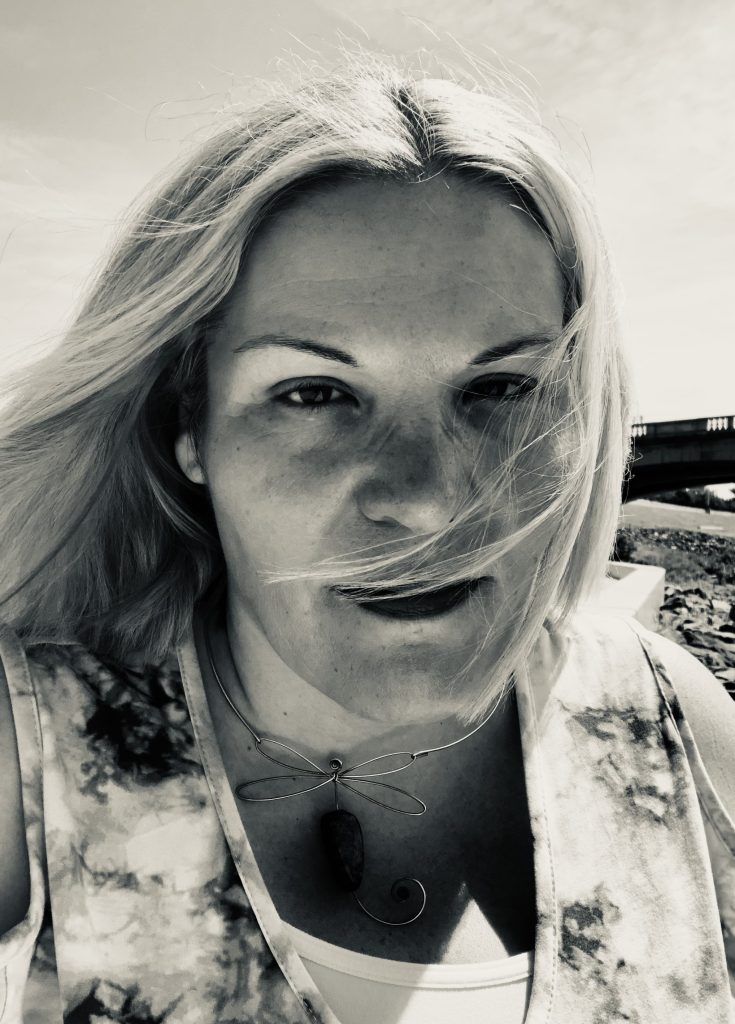
Kristin Ivey (M.F.A. ’21, Wilkes University) is The Dog Days Writer, an English teacher, and the Managing Editor for Kaylie Jones Books. Her work has been published in Hippocampus Magazine, The Obsequious Pen, Revise This!, The Write Life, Spark Anthology IX, Lehigh Valley Lit Magazine, and the Pennsylvania Bards Northeast Poetry Review. She facilitates writers’ workshops in and around the Lehigh Valley area.
Molly Bilinski for The Write Life
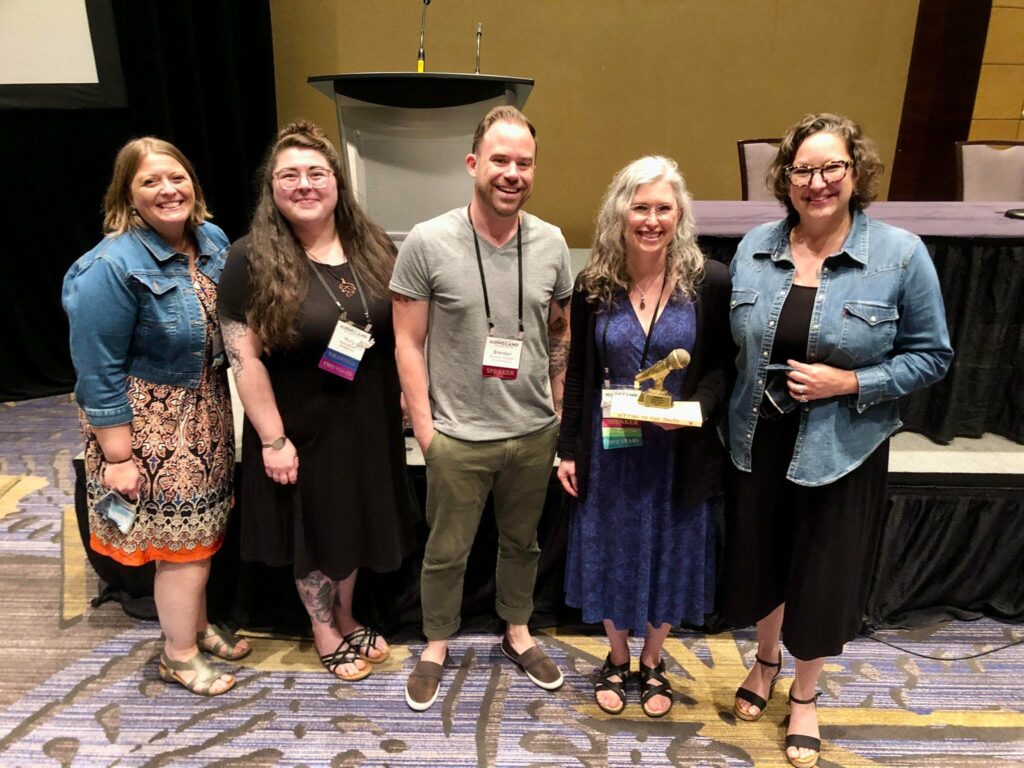
“We all tell stories to our friends, family, and even complete strangers every day. I do that. But I’d never done it, like, professionally.”
As a writer, how often do you speak your work aloud? Perhaps you read your words back to yourself when in revision, or maybe you give an oral reading here and there to promote your work. But what about giving a reading of a new, even unwritten piece, on the spot, in front of an audience and a panel of judges?
For some, it sounds terrifying. For current student Molly Bilinski, it sounds like a challenge worth taking. Head over to the Write Life to read about Molly’s first time participating in the Hippocampus Magazine-produced Lancaster Story Slam, in which she ended up taking third place.
Activism in Every Medium: In Conversation With Ru Freeman
by Hallie O’Neill
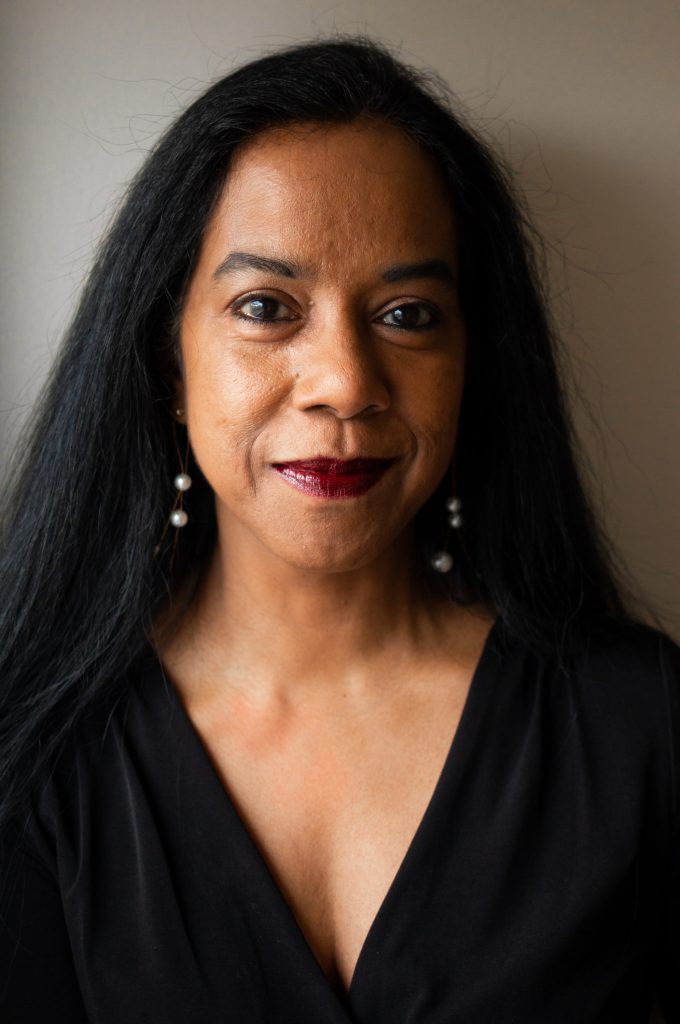
Ru Freeman, a recently new faculty member to the Maslow Family Graduate Program in Creative Writing, has adapted her knack for storytelling to an impressive variety of forms. Her latest work, a collection of short stories called Sleeping Alone, was published in June of this year and showcases a newer set of writing chops. Though she mainly considers herself a novelist, she also writes poetry, nonfiction, and now these short stories – a collection that’s been decades in the making.
“Someone I know kept saying, ‘Why aren’t you putting these stories together?’” said Freeman. “Sometimes, as a writer, you need someone else to recognize something like this. You’re always downplaying the things that you do – you need someone to say, ‘this is really good.’”
The collection allowed her to pull together stories that had been sitting on the side of her other major projects for years, including two published novels, a still under-revision poetry collection, and political essays and opinion pieces published in places including Huffington Post and UK Guardian, many of these about her birth country, Sri Lanka. Freeman described language as her clay; she shapes it to whichever medium or genre is needed for the story.
This molding became necessary when finishing Sleeping Alone. As she rounded out the collection, she wrote towards its theme to create the final pieces. The collection explores the crossing of both real and imagined borders, many of the characters’ central conflicts arising from the inability to truly see each other beyond the surface. She extracts this idea in part from her experiences as an immigrant.
“I’ve been here [in America] for a long time, but I’m never here. I’m always not from here,” says Freeman. “However well you perform being an American, you’re not. That affects how you see things.”
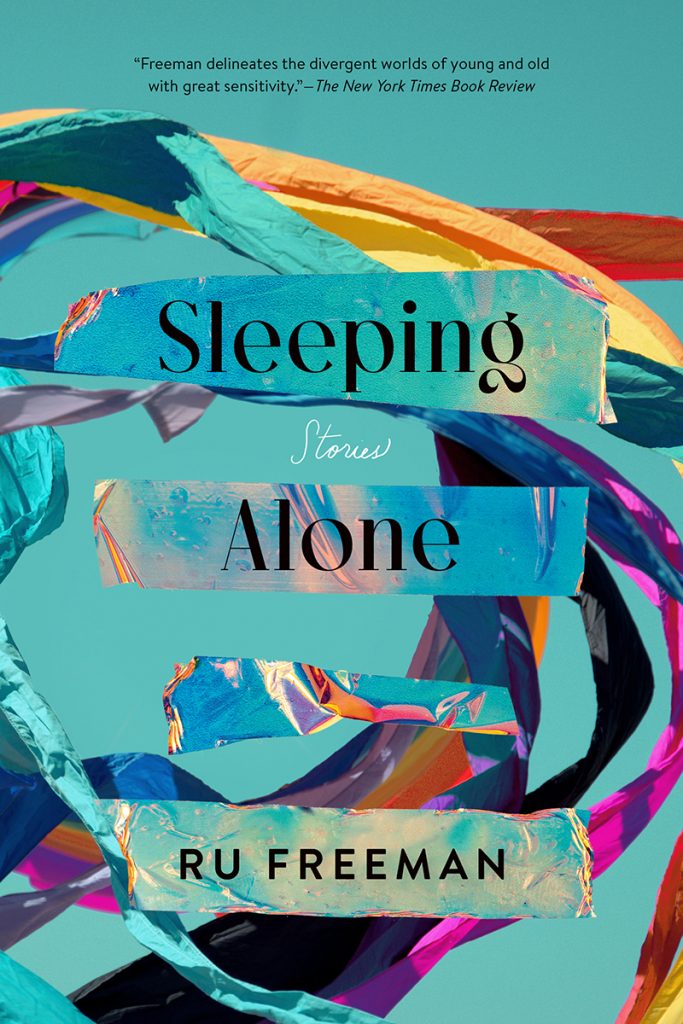
And there’s more. Freeman has an essay collection forthcoming with Etruscan Press in 2023 called Bon Courage, which she describes as a “collective of things”: personal essay, political commentary, and even memoir are utilized to tell stories about Bowie and Dylan to Palestine to the #MeToo movement. The collection is an unabashed effort of activism, something she practices in all modes of her work.
In many other countries, she says, writers are at the forefront of current events, and for good reason – writers can articulate their words better than anyone else. But she finds that isn’t the case here, particularly with writers who don’t want to get political or who don’t want to say anything that might upset their audience or potential readers. What she intends with her collection is to declare to writers that they can have their opinions, they can participate in the world in so many different ways, and they can also write beautiful things.
“I wouldn’t filter my opinions worried that someone won’t buy a book. As a writer, I want to articulate my activism and social justice,” Freeman said. “If you want the world to change, you need to pay attention and be involved in it. The collection is almost a craft book on how to be a writer – you use your language.”
This message is what she often advises her students: let’s get involved in the world, as human beings and as writers. You can explore Ru Freeman’s work on her website, which includes where to purchase Sleeping Alone and her other published works. Stay tuned for the release of Bon Courage by Etruscan Press in 2023.
Free Oral Workshop Offering by Student Katie King
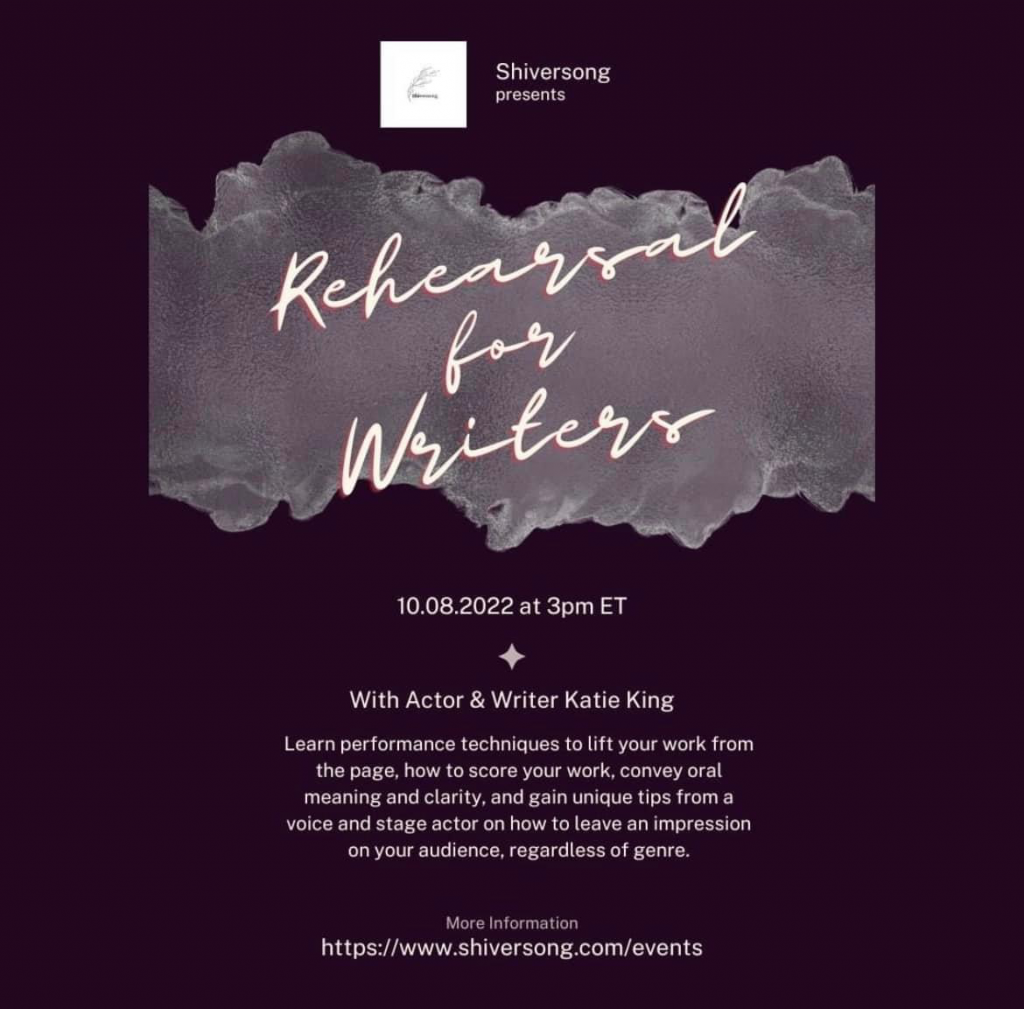
You spend hours a day writing, but how much time do you rehearse for readings? Readings are one of your biggest marketing tools as a writer, but professional writers still struggle with the following questions: What do I wear? Where do I look? How do I transition between pieces? Which pieces do I choose? Do I sound OK?
Writing and reading your writing are completely different skill sets. I noticed that coming into the literary world with a theatre background was really beneficial because people were remembering my work. Now, I wouldn’t say my writing was better than the person before or after me – but I read it better.
I came to realize that this is a very specific talent that many amazing writers don’t have. I want to share what I know with you. If you are a writer, come to my workshop this Saturday. I can show you how I’ve used two decades of theatre work to pertain specifically to successful literary readings. I’ll spend individualized time coaching you as prep for the workshop. We’ll go over formulas that put literal voice to your voice on the page, and more. Get ready to move, because we’re gonna have some fun!
Visit this link to attend Katie’s free virtual workshop on Saturday, October 8th at 3PM ET: https://www.shiversong.com/event-details/rehearsal-for-writers-an-oral-workshop-for-literary-readings-with-katie-king.
Faculty News
Bonnie Culver presented a paper at the 19th Annual Mailer Society Conference in Monmouth, NJ titled, “Revisiting The Prisoner of Sex and Feminism.” Her play, “FDRM presents Arts Seen: an interview with host Noa Daviees (Bonnie Culver) and Norman Mailer (Matthew Hinton),” co-written with Matthew Hinton, was also presented at this conference. Her screenplay Raining Rainbows was a quarterfinalist in the Cinestory Foundation’s Feature Film Competition, 2022. This screenplay was also a finalist in the Mystic Film Festival’s Screenplay Competition, 2022. The grand prize winner will be announced at the October Film Festival. A Ticket to the Circus, a one-woman show starring Anne Archer and directed/produced by Michelle Danner, will be available for streaming in January 2023 followed by a live in-person theatrical opening (TBD). Her publication, “Marlon James meets Norman Mailer,” will be included in REFLECTIONS: MAILER AT 100, to be released in January 2023 to celebrate Mailer’s 100th anniversary.
Ru Freeman has a number of speaking engagements and appearances forthcoming in promotion of her book, Sleeping Alone: Michigan Quarterly Review Special Issue on Democracy, “An America Worth Fighting For,” Virtual Launch on October 1 at 7pm; Polytechnic, LA on Wednesday, October 12; Louisiana Book Festival on Saturday, October 29, Baton Rouge, LA; Miami Book Festival, Friday, November 18 in Miami, FL. Follow Ru’s work at ru@rufreeman.com, or through her Facebook page (Ru Freeman) or Instagram (@amrufreeman)
Kaylie Jones has accepted the position of full professor at SUNY Stony Brook and will be back East during the semester terms.
Ross Klavan has been contracted for a job as head writer (team of three) on a horror film project with MCM Productions in NYC, with a budget starting at $5 million. He’s working in conjunction with one of the artists/designers at Epic video games.
J. Michael Lennon’s memoir, Mailer’s Last Days: New and Selected Remembrances of a Life in Literature, will be published by Etruscan Press on November 15. He is also co-editing (with John Buffalo Mailer) a collection of Mailer’s writings on democracy. A Mysterious Country: Norman Mailer on the Grace and Fragility of Democracy will be published by Arcade/Skyhorse on January 31, 2023, Mailer’s 100th birthday.
Robin McCrary has published comic book scholarship, titled “Queer(ing) Robin: Performances of Sexuality in Dick Grayson and His Aliases,” in the volume ‘The DC Comics Universe: Critical Essays’ (Ed. Douglas Brode, August 2022).

Alumni News
Jake Cannington (MFA 2022) is now a librarian in the Baltimore County Public Library system where he will be hosting an in-person 6-session course on writing fiction running the first Thursday of each month from November through April. Anyone is welcome regardless of writing experience or ability. It will be a registered event. Registration details can be found on the BCPL website (bcpl.info) closer to the date.
Jeffrey Ford (MA 2017) is co-producing the new season of Mystery Science Theater 3000 which continued on September 30th with episode number 1310 – H.G. Wells’ The Shape of Things to Come. On October 28th, there will be a special 3-D Halloween presentation of The Mask. Tickets and videos are available at: https://www.gizmoplex.com/browse.
Sara Pisak (MFA 2020) wrote an essay called “Fallout,” which she began in Dr. Lennon’s class, that was recently published by The Rumpus.
Douglas James Troxell (MA 2013) recently released the second book in his YA post-apocalyptic series, After the End. The third book in the six-book series will release in winter 2022.
Andy Wilczak (MFA) co-edited the third issue of Untenured with Caroline Hayduk, which was recently released. This issue and the call for submissions for the next issue are at untenured.space/current-issue. Andy’s Twitter and IG: @heydrwil

Student News
Suleyman Anadol recently finished the first draft of his manuscript! It took him about 11 months of writing, but after almost 115,000 words, he finally finished it. Getting the manuscript printed up made it all feel that much more real. Suleyman’s Instagram: @suleyman91.
John Cornelius will be doing a freelance editorial assignment for Etruscan Press after his internship with them concludes in October 2022. John’s social media: @j_cornelius_writer
Travis Harman was published by Line of Advance Literary Journal on September 27th, 2022 for his nonfiction piece titled MEDEVAC. He wrote this piece during his first residency at Wilkes.
Ashlee Harry published her poem, “Garden of Secrets,” with the Manuscript Society at Wilkes.
Josh Holycross was invited by IUPUC to read from his manuscript on Thursday, September 29th at the Air Park Creative Reading. The reading took place at Mill Race Center in Columbus, IN and the event was free and open to the public.
Mike Kentz recently had an article published in the Princeton University student newspaper — The Daily Princetonian — about the death of its famous basketball coach and Kentz’s senior thesis. Also, the students at his school are going to use the short play he wrote for Residency in a One-Act competition coming up in a few months.
Shari Nichols’ third book in her award-winning urban fantasy series, Raven’s Hollow Coven, titled Midnight Craving, is now available for purchase. Midnight Craving is featured today on the NN light blog spot for a cover reveal. The official release day was Tuesday October 4, 2022, just in time for Halloween. After Midnight, book four in the series and a whimsical novella, will launch in February with City Owl Press. Shari will be doing live readings throughout the month of October.
Cassandra O’Sullivan Sachar has had eight pieces published or accepted for publication since June: fiction in Quagmire Literary Magazine, The Pine Cone Review, Ink Stains: A Dark Fiction Literary Anthology, and Down in the Dirt Magazine; creative nonfiction in Fresh Words: An International Literary Magazine, Impost: A Journal of Creative and Critical Work, and The MockingOwl Roost; and a practitioner article in Educational Leadership. Additionally, she will present her creative nonfiction piece “The Longest Mile” at the English Association of Pennsylvania State Universities Conference in October.
Amanda Rabaduex’s chapbook was named a finalist in the Two Sylvias Press 2022 Chapbook Contest and one of her poems was nominated for a Best of the Net award. Follow Amanda’s accomplishments at amandarabaduex.com or on Twitter (@ARabaduex) and Instagram (@amanda_rabaduex)

Freediving in Indonesia
By Nancy McKinley
“Peculiar travel suggestions are dancing lessons from god,” quips Kurt Vonnegut in Book of Bokonon. The dictum echoes when my daughter, Hali, working in Jakarta, asks me to join her and Rodolfo for an Indonesian adventure: “We’ll explore outer islands and go diving.” I’ve wanted to visit there since my twenties, when l taught in the Virgin Islands and spent free days underwater, enthralled by the Caribbean reef, yet hearing from other divers how Indonesia was paradise, the nexus of marine life.
Additional reasons prompt the trip. I’m crisp around the edges. Having preached that travel helps writers get inspired, heighten senses, and spark motivation, I need a dose of my own advice. More importantly, I might discover ways to write about my days as a champion, freediving spear-fisher. For decades, I’ve gotten waylaid when attempting those words. Why can’t I describe my 100 ft freediving descents—no scuba tanks—to spear prize fish and kick back to the surface on a single breath?
We choose the destination of Raja Ampat, the eastern most archipelago, opting to stay on Gam and Arborek. Accessible only by 12 foot wooden long-boats, the idyllic gems straddle the equator: no cars, scant electricity, and undoubtedly so hot and humid, I’ll sweat away my burnout. Online, we book flights, ferries, boats, and reserve thatched-palm bungalows, built on stilts over the water. Rodolfo uses WhatsApp with a dive operator and tells me, “Women there want to meet you.”
Huh? Did his Google Translate scramble Bahasa, the national language?
“I told him about your records, and he said women, not men, used to spear fish for the community. You should dive together.”
“I haven’t spearfished for ages.”
“Today men use boats to net the fish. The women are old.”
What’s island-old? Forty, I wonder, curious about the women’s former role as underwater hunters. Spearfishing is more like hunting than casting nets. Did the women stalk prey like I did, pressing the speargun’s lethal trigger, followed by a pull on the connector line—the tug of departing life. I don’t say kill. Yet I, Ms. Peace & Love, was a champion killer. Sure, the fish provided food, and I hadn’t intended to compete. I got into the sport because fish was expensive, and teachers received low pay. A colleague invited me to join him and other spear-fishers. I proved a surprisingly good shot, descending deep as the men, and if one started passing out from breath loss, I could assist, owing to my strong kick and lung capacity, carryovers from swim team.
As I excelled in dive tournaments, sponsorship followed, buoying my pride along with awareness: I was a novelty—female, single, and white—making inroads to communities I wouldn’t otherwise, always wishing for more spear-fishers like me so we could talk. Yet, I’m not sure I had the mindset to discuss what loomed large: the nature of taking life from fish.
And now? Now, I inhabit a different place. “I’d like to meet those women.”

